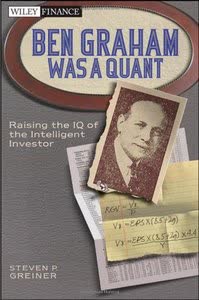Dividend Value Builder Newsletter
– Discover, Compare, and Evaluate Stocks Without Emotional Bias –
(Intrinsic Value Analysis For over 300 Stocks)
Who is Benjamin Graham? How Did He Change Security Analysis?

Benjamin Graham laid the foundation of value investing with a set of concepts and principles that changed security analysis and influenced many investors (including Warren Buffett).
When someone says “The Father of Value Investing” most value investors know they are talking about Benjamin Graham (1894 – 1976). Graham developed the concept of fundamental security analysis, and introduced value investing strategies that are still guiding successful investors today.
The Early Years
After studying at Columbia University Benjamin Graham began working in 1914 and accumulated a large personal portfolio, only to lose most of it in the 1929 crash and great depression. This led him to publish, in 1934, the first of his iconic books “Security Analysis”, in which he documented his analysis and methods of security valuation.
The Father of Value Investing
Benjamin Graham developed the concept of comparing valuations and adhering to strict value investing rules. The Father of Value Investing and his work lives on through his writings and followers. Value investors, including some of the greatest of all time, use his concepts everyday to build long term wealth.
Warren Buffett declared Graham’s famous quote that “investment is most intelligent when it is most businesslike.” as “the nine most important words ever written about investing”.
Professor Benjamin Graham
Graham loved investing and mentoring others. As a Columbia University professor he taught Warren Buffett, who has proclaimed Graham’s book “The Intelligent Investor” (1949) the “best book on investing ever written”.
The Intelligent Investor
In The Intelligent Investor Graham used his teaching skills to outline his criteria for finding value. He used the famous parable of Mr. Market to illustrate how an intelligent investor should think and exploit market volatility.
Graham also developed the concept of margin of safety which requires purchasing assets below a conservative valuation of the business. In other words, price matters. The greater the margin of safety the less risky the investment, because there is more room for mistakes or unforeseen events.
Graham developed a ground breaking approach to analyzing securities. He used the concept of intrinsic value in comparison to the stock price and establishing a margin of safety before he was willing to invest.
Everyone is subject to making behavioral errors; that is what makes his concepts and rules so pertinent in any era.
“Investing isn’t about beating others at their game. It’s about controlling yourself at your own game.”
Benjamin Graham
He taught that the Defensive Investor should fixate on large, prominent companies whose stocks are unpopular.
The Enterprising Investor was provided a list of do’s and don’ts to achieve a higher rate of return but with deliberate measured risk.
Fundamental Security Analysis
Graham preached fundamental security analysis based on what we know today. It’s difficult enough to base valuation on what we know let alone trying to make predictions about the future.
He wanted investors to quit paying for forward looking earnings estimates that are often too optimistic. Predictions are one of the easiest ways to make assumptions that are inaccurate.
Benjamin Graham influenced generations of investors through his teaching and mentoring. Value investors have a foundation of fundamental security analysis which provides valuable guidance for those who are willing to listen and be disciplined in their investigation.
Minimize Large Portfolio Drawdowns
Invest With Confidence in Less Time - Manage Your Portfolio Without Behavioral Errors
